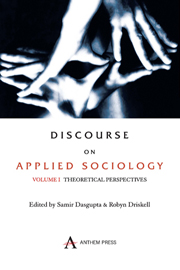Book contents
- Frontmatter
- Contents
- Preface and Acknowledgement
- Contributors to this Volume
- List of Abbreviations
- Introduction
- 1 Re-Orient World History, Social Theory and the Nineteenth Century
- 2 The Unique Complexity of Social Phenomena and the Uses of Social Science Knowledge
- 3 Unlimited Love, Compassion and Forgiveness: Acts of Moral Examplars
- 4 Theoretical Application
- 5 Applied Sociology's Need to Rethink the Tradition: Sociological Theorizing in a Global Framework
- 6 Social Analysis and Social Action
- 7 The Applied Sociologist as Craftsman
- 8 Applied Sociologists: Its Problems and Prospects
- 9 Sociology and its Application in Society: Giving Sociology its ‘Working’ Meaning
- 10 The Evolution of Sociology Back to its Applied Future
- 11 Contemporary Corporate Crime: Theoretical Perspectives, Cases & Consequences
- Index
6 - Social Analysis and Social Action
Published online by Cambridge University Press: 05 March 2012
- Frontmatter
- Contents
- Preface and Acknowledgement
- Contributors to this Volume
- List of Abbreviations
- Introduction
- 1 Re-Orient World History, Social Theory and the Nineteenth Century
- 2 The Unique Complexity of Social Phenomena and the Uses of Social Science Knowledge
- 3 Unlimited Love, Compassion and Forgiveness: Acts of Moral Examplars
- 4 Theoretical Application
- 5 Applied Sociology's Need to Rethink the Tradition: Sociological Theorizing in a Global Framework
- 6 Social Analysis and Social Action
- 7 The Applied Sociologist as Craftsman
- 8 Applied Sociologists: Its Problems and Prospects
- 9 Sociology and its Application in Society: Giving Sociology its ‘Working’ Meaning
- 10 The Evolution of Sociology Back to its Applied Future
- 11 Contemporary Corporate Crime: Theoretical Perspectives, Cases & Consequences
- Index
Summary
My interest over the years has moved from the study of smaller social units to that of larger ones, from greater concern with conceptualization to an emphasis on the social relevance of social science and from a fair segregation of the role of the sociologist and the active citizen to a greater effort to articulate the two. In doing so, I believe my work reflects trends which affect social sciences in general and sociology in particular. I shall focus first on these trends and then briefly discuss a contribution I might have made to their extension.
Numerous sociological article begins with a definition of a new concept (or relationship) and a discussion of methods to be employed to measure it. Such a definition is frequently followed by presentation of some data relevant to the new concept and familiar sociological variables related to it as for instance, ‘the distribution of elephantiasis by age and sex in the cities with a population of over one hundred thousand’. Most sociologists, the author included, feel that such combination of theory and methods forms the very foundation on which sociology as a science ought to be built. In fact, it is being constructed on such a foundation. But many of us also feel that something is lacking.
What is lacking most is social analysis, the systematic exploration of social issues, i.e., concern with the methodological questions of sociological analysis of the great issues of our age, which tend to involve the study of macroscopic units.
- Type
- Chapter
- Information
- Discourse on Applied SociologyTheoretical Perspectives, pp. 157 - 164Publisher: Anthem PressPrint publication year: 2007



